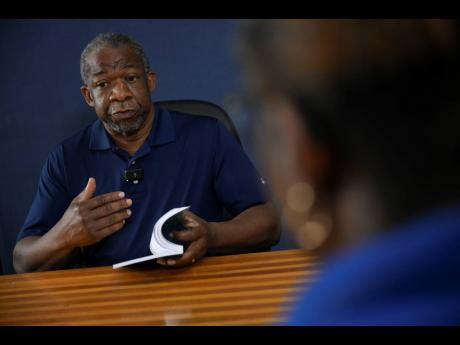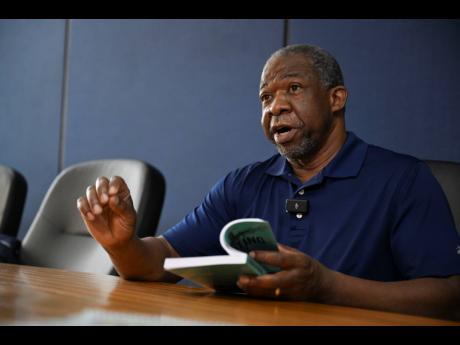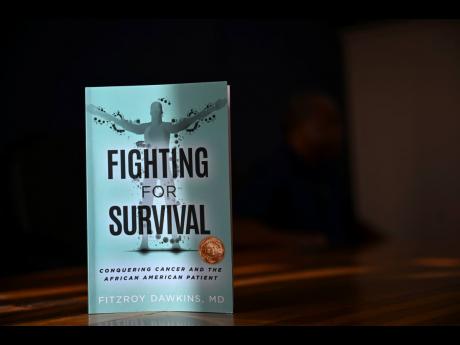Dr Fitzroy Dawkins’ love letter to African Americans
Ja-born oncologist says fear, distrust of health system preventing early detection, treatment of cancers in black communities
The history of racially motivated experimentation on black Americans within the United States health system – often conducted without their knowledge or consent – has had a detrimental impact on black healthcare in the country, asserts Jamaican-American oncologist Dr Fitzroy Dawkins.
In an interview with The Sunday Gleaner last week, he said denial, distrust and fear – of the disease itself and of being used as guinea pigs – looms large in the cancer culture in African Americans, and during active practice, he tried to change the deep-seated positions.
“So much has changed in medical protocols over the last half century that these fears are no longer valid. Yet, African American cancer patients have essentially sidelined themselves from finding a cure. There’s no doubt that medicine has made incredible strides in treating and even curing cancers. But there’s a portion of the population that’s missing out on these medical advances. Despite the advances, the African American history in the health sector is still very poignant today,” he said.
In his book, Fighting for Survival – Conquering Cancer and the African American Experience, he said black Americans are not only haunted by the Tuskegee experiment, but also that of Henrietta Lacks.
Lacks, during treatment for cervical cancer at Johns Hopkins Hospital in Maryland in 1951, had her cells cultured to create a cell line called HeLa without informed consent, and which is still being used for medical research.
But the ghost looming largest is the Tuskegee experiment, which went on for 40 years in the US using hundreds of black men as part of an experiment to observe the natural progression of syphilis, without treatment, until a whistleblower blew the lid. The men, impoverished sharecroppers from racially curdled Alabama, were part of a research that should have been six months, but which lasted four decades. They never gave consent to be part of the experiment, and were never offered treatment, though antibiotics became widely available 15 years after the experiment started. Untreated, they experienced severe health issues, including blindness, mental impairment and death.
Dawkins says experimentation using black people was taking place for years before Tuskegee, and Lacks, but the two exposed the evil of institutional racism.
The deep-seated distrust of the sector and its offerings have left African Americans disproportionately excluded from research that could detect and treat, all cancers in the early stages, and, especially prostate cancer, according to Dr Dawkins.
The book, which he says is his love letter to African American cancer patients and his plea is for them to fully embrace all that research and medicine has to offer, so they can fight and cure their cancers.
“It (the distrust) is still with us, when we see the whole COVID-19 experience and what people talked about and it’s ‘I don’t trust the government’. ‘If they say this is the case, I don’t trust them.’ ‘They just want to use me for their purposes.’ There are African Americans who disagree with me on this so I don’t think it’s a monolithic response, but in my view, in my practice at Howard University, Tuskegee was forever present when I talked about clinical trials,” he told The Sunday Gleaner.
Road to medicine
But how did this Jamaican become so influential in the US black health community?
Dawkins told the story of a mystery illness, which prevented him from doing his high-school placement exams at the same time with hundreds of other pupils, and left him spending months in a cast from chest to toe at the University Hospital of the West Indies. He was not told about the cause of his illness, but he recalled multiple surgeries and procedures and countless trips to the hospital. Years later, he believes he had an infection of the hip bone.
After about six months, he was discharged to his aunt in Newport, Manchester.
But years before his illness, Dawkins had decided that he wanted to be a doctor and during his hospitalisation, the medical intervention involving orthopaedic surgeon Professor Sir John Golding solidified his choice. Dawkins regaled Golding for “his care in treating the patient as a whole, both mind and body” and intervening so he could do his exams.
Dawkins recalled the weight on his shoulders to ace the exams, which he sat alone at the Ministry of Education, doing well enough to secure a place at Manchester High. He would later transfer to Wolmer’s Boys’ School at the end of the first term of third form to complete high school.
Born and raised in St James, he grew up in different parts of Jamaica, moving among relatives, including his mother, who was a registered nurse/midwife, but functioned in several capacities in the communities where she served.
Dawkins recalled how his mother would disappear for days when called to deliver babies in the hilly terrain of the rural areas as sometimes, the babies would take days to make their appearance. His mother would have to wait until their birth before returning to her children.
“My mother’s dedication as a nurse, working in remote areas had a tremendous impact on me. The fact that I became a Christian at 14 years old had a tremendous impact on my worldview. Dr Golding to me was more than just an orthopaedic surgeon. I remember distinctly him in my room at the hospital with his team and asking someone if I shouldn’t be taking Common Entrance Exam. They said yes, but the time had passed. And he told someone to see what they could do so I could sit the exams before the results were published,” said Dawkins, recounting the event as something for which he is forever grateful.
Golding, he said, epitomised all he wanted to be in a doctor and was his motivation while in active practice in the United States.
The immigrant story
After leaving Wolmer’s, Dawkins’ mother told him of the life-changing decision made for him that would see him boarding an airplane for the first time, travelling solo to New York. He was only given an address – that he dared not misplace – as he went to live with strangers and was told to “figure out” his quest to become a doctor.
His experience was common to thousands of immigrants in the US – unwelcome in their communities and places of study.
The young Dawkins worked multiple odd jobs – in the fashion industry, in a factory making plastic utensils, washing pots, and serving food. He was also being tempted into criminality, but found strength in the values ingrained in him in Jamaica.
Nearly a year after landing, he saved enough to pay for part of his college education and applied to City University of New York to read for a degree in biology. This he saw as a step to opening the door to medicine.
He rode his bicycle daily as the 35-cent train ride was too expensive and after work, he went home to study, sleep, then head back to school – a routine he maintained for four years.
After graduating in 1979, he spent a year working with an insurance company before heading to medical school and began working as a janitor cleaning a bank.
Medical school was brutal as he came face to face with racism, which was openly displayed by students and some faculty.
“I went to school upstate New York in a city called Buffalo. The city itself was hostile to black folks. You were seen as ‘the other’. And it wasn’t just black folks. If you were not from the area – even if you came from New York and especially if you came from New York City – they were not particularly enamoured with your presence.
“So here comes this black kid in a class of 145, ten of us being black, and with the sense of ‘we don’t want you here; you don’t belong here, and we don’t want you in our neighbourhood, and we really don’t care for you’. This was the city and the medical school was equally hostile,” he recounted.
Dawkins said the camaraderie he expected was not forthcoming, especially as it was made clear he did not come from generations of physicians, unlike other students.
The memories remain painful and he would rather not dwell on them, but they are included in the book as learning experience, and, hopefully, will serve as a lighthouse for others facing oppression and exclusion.
“I have been through the deep waters. I have been called names. My car has been painted [with racial slurs]. I have been held up and threatened with death, and I survived. So I went through this, you are going through this, so take a page out of my book to realise that you don’t have to accept the status quo and despite the perceptions there are of you,” he said.
Cancer diagnosis, treatment
Dawkins not only beat the odds, but devoted his active years to research and treatment of cancers among African Americans. He admitted some bias, but said in the oncology space, there is a huge disparity. He wants them to push for what’s rightfully theirs.
“Part of what holds us back, I think, is fear. Not just distrust of the system, but fear to even say the word cancer. Some people will not even share the information with their families … . So much of cancers is about genetics. We don’t like talk about it because we hope it will go away; we hope that God will heal us, and if we pray hard enough everything is going to be okay. The push that I have is, ‘You should do what you can. The system may be against you, but you should do what you can’,” he pleaded.
Addressing the issue of prostate cancers in black men, he said that there are significant issues, including homosexual innuendoes from having a finger inserted in the rectum to screen for an enlarged prostate.
“The thought of someone putting a finger in your rectum, I mean, who would allow that? There are crass jokes told among patients about not putting things in your behind, so that having a colonoscopy or sigmoidoscopy – the minimally invasive medical examination of the large intestine from the rectum through the nearest part of the sigmoid colon – [is shunned] because it might imply this or that … ,” he explained.
Much of the fear, he said, is that it would impact their sexual prowess if part of the treatment is removing parts of their rectum. Manhood, he said, is largely defined in the black community as the ability to have sex, a mindset that is to the detriment of many.
Locally, oncologists have expressed the same concerns for men.
Dawkins said many discoveries have been made in the treatment of cancers, and while not asking black people to forget Tuskegee, he wants them to use the experience to get treatment. He stressed that many are missing out on opportunities in clinical trials that could change the trajectory of their lives for the better as too many only show up with third-stage and endstage cancers, when early detection could have made a difference.



